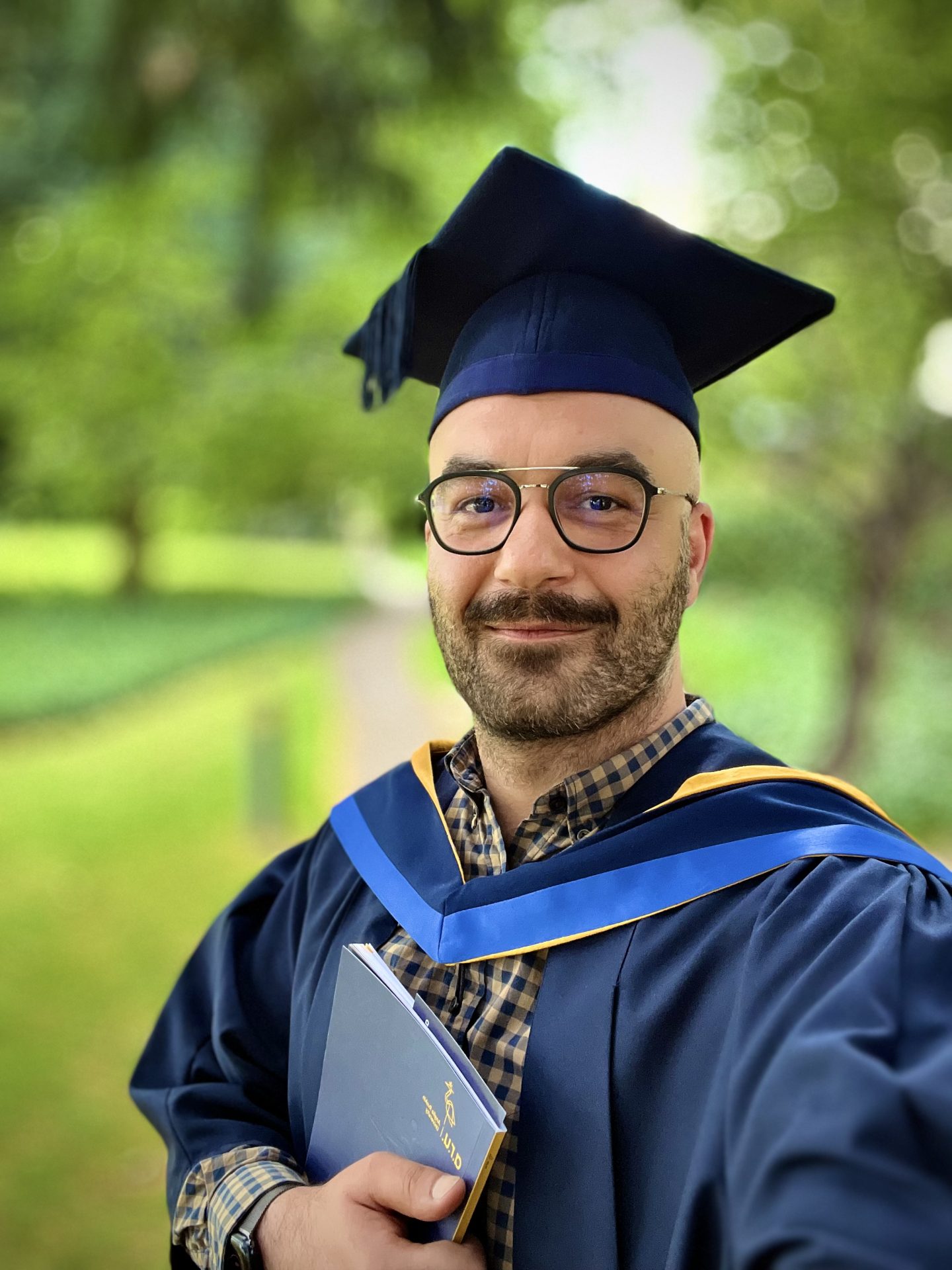About your course
Our MSc Biomedical Science course will progress your scientific skills, allow you to explore exciting new specialisms and enable you to develop an advanced knowledge of biomedical science.
This course is ideal if you're a working biomedical scientist looking to take the next step towards Chartered Scientist status, or further your research career by exploring research projects relating to your particular interests.
The online MSc biomedical science course structure has been created to give you the flexibility to develop your career around your other commitments.
Course highlights
- Tailor your studies by choosing a specialist independent research project in an area of personal interest and relevance to your laboratory
- Develop a range of management skills that can be applied to your own work in any of the pathology specialisms
- Our Biomedical Science Masters is guided by an employers’ panel that includes the NHS
- Accredited by the Institute of Biomedical Science (IBMS)
How you'll study
This course is studied 100% onlineStudy this course over 3 years
Start in January or September
30th April 2024
Fees: £8,200
Professional accreditation
UK Quality Assured
Course overview
Whilst studying our biomedical science masters course, you’ll have the opportunity to tailor your studies by choosing a specialist pathology area to hone your research skills. Through this you can either enhance your knowledge and gain an in-depth understanding of your current field, or open up a career path into a new area.
As well as having the opportunity to apply your knowledge and expertise to different specialisms such as Haematology, Clinical Chemistry, Cellular Pathology, or Medical Microbiology you’ll develop a range of management skills that can be applied to any pathology specialism.
From the start of this Masters in Biomedical Science you’ll be supported by our tutors. The tutors include ARU lecturers and Health and Care Professions Council (HCPC)-registered hospital practitioners: Senior Biomedical and Clinical Scientists bringing a diverse range of knowledge and experience.
Accredited by the Institute of Biomedical Science (IBMS) and guided by an employers’ panel (including the NHS), this course is a great asset to your professional development, whether you’re working in healthcare or industry.
Institute of Biomedical Science (IBMS) accredited
IBMS accreditation ensures that our degree course covers the specified subjects at the required level to meet the Health and Care Profession Council (HCPC) standards of proficiency for biomedical scientists. It also ensures that you receive a wide-ranging, research informed scientific education and develop the practical skills and experience that employers value.
Modules
Due to the structure of this course, there will be instances where you will study two modules simultaneously during a trimester. You will be supported by your tutors to help manage your workload and assessment deadlines.
Please contact one of our advisers to discuss the pacing of this course and the options available to match your circumstances.
General Pathology
This module is designed to enable you to fully understand the principles of pathology and to illustrate the required knowledge base and principles using case studies. You’ll develop a full understanding of disciplinary methodologies, both theoretical and research based. You’ll also conduct a study of immunopathology and transplantation to illustrate the interaction of pathology and immunology.
Moving towards Mastery
This module enables the learning which you must undertake in order to provide a foundation for your post-graduate study; using subject related examples as tools for your learning. You'll learn to develop the style and techniques which are essential to your success in the MSc and to practice the assessment methods. You'll learn to appreciate the concept of Mastery and demonstrate the depth and systematic understanding of knowledge and the ability to work with theoretical and research-based knowledge at the forefront of your academic discipline.
An Introduction to Management in Biomedical Science
This module is designed to help you develop a range of management skills that can be applied to your own work in any of the pathology specialisms. It is based on a scenario in which an accreditation visit to a laboratory has failed. You will produce a business plan to correct the deficiencies identified and, in so doing, provide the evidence that you have achieved the learning outcomes.
Research Methods in Biomedical Science
You’ll gain the skills to confidently carry out biomedical research by investigating the selection, application, analysis and evaluation of a range of research methods. You’ll consider ethical aspects and discover development and implementation of your future research project in biomedical science. You’ll prepare a portfolio of evidence and focus on self-evaluation via critical reflection.
Biomedical Specialisms 1 - Epidemiology and Pathogenesis
This module provides an opportunity for you to apply your knowledge and expertise to a subject specialism of your choice: Haematology, Clinical Chemistry, Cellular Pathology, or Medical Microbiology. If your circumstances best suit a cross-disciplinary choice, that can also be accommodated.
Biomedical Specialisms 2 - Diagnostics and Treatment
This module provides an opportunity for you to apply your knowledge and expertise to a subject specialism of your choice (Haematology, Clinical Chemistry, Cellular Pathology or Medical Microbiology) within the context of disease diagnosis and subsequent treatment and control. If your circumstances best suit a cross-disciplinary choice, that can also be accommodated.
Masters Project
You’ll choose a research topic relevant to your laboratory and conduct a significant research project that may involve a literature review, data collection, analysis and a write-up. The final piece of work should be equivalent to a maximum of 10,000 words.
Modules are subject to change and availability.
Assessment
We’ll assess your progress using the portfolios you’ll create for each taught module, as well as your final year dissertation.
Meet your tutors
Dr Richard Jones
Richard has over 15 years postdoctoral experience in molecular biology, biochemistry, biophysics, and cell biology.
Before joining ARU, Richard completed four Postdoctoral Research Associate positions at Yale University (USA) and at the universities of Leeds, Manchester and York.
Qualifications
- PGCLTHE, Anglia Ruskin University
- MB ChB Medicine, University of Leeds School of Medicine
- PhD in NMR Spectroscopy, University of Manchester Department of Chemistry and Zeneca Pharmaceuticals Department of Cardiovascular and Musculoskeletal Research
- BSc (Hons) Chemistry and Molecular Physics, University of Nottingham
Richard's research interests include biochemical and biophysical studies of extracellular matrix and membrane proteins implicated in human eye, skin and vascular diseases. He collaborates with Professor Clair Baldock and Dr Tao Wang (University of Manchester, UK) and Professor Gladys Ko (Texas A&M University, USA) investigating the structure and function of eye proteins, the dysfunctions of which are implicated in different macular degenerations.
Richard's broad background has enabled him to supervise students' final year bioinformatics and meta analyses projects in areas including dystonia; Huntington's disease; myasthenia gravis; generalised anxiety disorder; legal and illegal highs; infection of cardiac rhythm management devices; foods for treatment of diseases; bioinformatics analyses of a variety of proteins; myocardial infarction; cancer biomarkers; fluid bag seal strength; diabetes and diabetic retinopathy; and amblyopia.
How you'll study
Our Biomedical Science MSc is studied 100% online.
You’ll study through Canvas, our world-class online Learning Management System (LMS), which can be accessed from your phone, pc or tablet at home or on the move. Canvas provides instant access to study materials, forums, and support from tutors and classmates, as well as enabling easy submission of your assignments.
On successful completion of your studies you’ll be invited to attend a graduation ceremony on campus. If attending the ceremony in person is not possible then we’ll arrange to have your certificate sent to you.
Supported distance learning
We understand that distance learning is different to traditional campus study and if you’re new to online study you may have concerns or apprehensions about studying your MSc Biomedical Science remotely, and that’s natural.
To help put your mind at ease we have a dedicated Distance Learning Support Team to help and support you throughout your time at ARU, starting with your first online induction and staying with you right through to graduation. In addition, you’ll also be supported by specialist module tutors, well experienced in supporting distance learning students.
Once you start your MSc Biomedical Science, we encourage the creation of online communities and many of our learners find these connections with others invaluable, helping them to stay motivated, share concerns or make new friendships.
Contact us to talk through any questions or concerns or visit our support page for more information about the support services available.
Be part of the University of the Year
We're proud to be the Times Higher Education (THE) University of the Year 2023.
The prestigious THE awards honour ’exceptional performance during the 2021-22 academic year, and reflect ARU’s success in delivering high-impact projects during this period, despite the challenges of the Covid-19 pandemic.
The award recognises the difference we make in the region and our communities – while also acknowledging the broader impact of our world-leading research, and the contributions our students and graduates make to society.

Accreditation
Professional recognition
Our Biomedical Science MSc is accredited by the Institute of Biomedical Science . IBMS accreditation ensures that our degree course covers the specified subjects at the required level to meet the Health and Care Profession Council (HCPC) standards of proficiency for biomedical scientists. It also ensures that you receive a wide-ranging, research informed scientific education and develop the practical skills and experience that employers value.

Careers
What could a Biomedical Science MSc do for my career?
You'll already hold an undergraduate degree in Biomedical Science, Fellowship of the IBMS or related Higher National Certificate and be working in a laboratory setting, but you’re looking to enhance your career, this postgraduate degree will do just that.
Furthermore, you’ll gain an internationally recognised qualification that will demonstrate your high level of specialist knowledge and quality of work to current or future employers where you may wish to seek promotion and career advancement.
Not only will you hone your current skills but you will discover new skills and adopt greater responsibilities in your chosen role, ideal for those with their eye on laboratory management positions. With this course, you can expect to widen your career prospects across a number of institutions including the NHS and the pharmaceutical industry.
What job roles can I consider with a Biomedical Science MSc?
A Biomedical Science MSc could lead to career advancement opportunities within public health, private pharmaceutical, and biomedical research areas, as well as clinical biochemistry. These are just some of the job roles that a Biomedical Science MSc graduate may consider, possibly with further training or experience depending on the role:
- Biomedical Scientist
- Research Scientist
- Biotechnologist
- Microbiologist
- Clinical Scientist
- Clinical Research Associate
If you are looking for more information about these job profiles and potential salary earnings see Prospects.ac.uk. It’s important to note that salaries can vary widely depending on the job role, employer, industry sector and location.
The Institute of Biomedical Science (IBMS) also has a useful careers section profiling various biomedical science job roles.
What skills will I get from the MSc Biomedical Science to help my career?
You’ll enhance your CV with a higher-level award that includes both deeper knowledge of scientific research and added transferable skills such as:
- Analytical and evaluating skills
- Integrating theory and practice
- Autonomy relating to learning and working
- Manage resources and information
- Problem-solving
- Communication skills
- Self-evaluation for professional development
What can I study after an MSc Biomedical Science?
Successful MSc students, who particularly enjoy engaging with the academic environment and who wish to pursue academic careers in lecturing and/or research, may progress to further postgraduate courses such as a PhD.
Careers Advice Service
Once you become an ARU student you will be able to access our Employability service to help you whatever the stage of your career, whether that’s landing your dream job or the next progression step.
We offer:
- careers advice, including one-to-one online and telephone appointments with our experienced advisers
- help with your CV, job searches, applications and interview preparation
- an online portal packed with useful careers resources
- our Employability Programme, which helps you hone the skills employers say they want in graduates.
Entry requirements
You must hold an undergraduate degree in biomedical science or equivalent, HNC with bridging course, or HNC plus laboratory experience. You should be employed in an appropriate laboratory to support your learning and your major project. Each applicant is considered on an individual basis. You are advised to contact Dr Richard Jones (richard.jones@anglia.ac.uk) prior to application. Two references must be supplied.>
If English is not your first language you will be expected to demonstrate a certificated level of proficiency of at least IELTS 7 (Academic level) or equivalent English Language qualification, as recognised by Anglia Ruskin University.>
As a distance learner, you'll also need a suitable computer with internet connection, together with sufficient IT competence to make effective use of our online learning management system (LMS) with high-speed internet and email.>
Fees & funding
Fees
The full tuition fee for this course is £8,200.
The tuition fees you pay each year for the full Biomedical Science MSc will be £2,733 or £2,734. The course is studied over 3 years.
Accredited Prior Learning may reduce the tuition fees. This will be confirmed once your application has been submitted.
Funding
Your course can be fully funded by the Postgraduate Student Loans now available (subject to eligibility).
We offer payment by instalments, so you can spread the cost of studying with us.
For military students: You can use your ELCs towards this course. Anglia Ruskin University is a recognised ELCAS provider (number 1007). Please contact your Learning Centre for details of ELC, eligibility and how to apply.
For more information on how you fund your studies please see our funding page.
What our students say
Overall, my experience with ARU was amazing. I felt supported, empowered and accomplished. I’ve achieved what I was hoping for when I signed up for the course and I’ve enjoyed every moment.
The skills and knowledge I have gained during my study have benefited my career with internal promotion, the ability to provide effective leadership to my teams and the confidence to look at further progression within my field.
For a mature student, distance learning is a match made in heaven. The Learning Management Systems are state of the art and the course tutors are committed to their responsibilities and care about you.
I chose ARU for their recognised global standing, their year-on-year improvements in higher education and partnerships with organisations demonstrated their investment in helping students.












